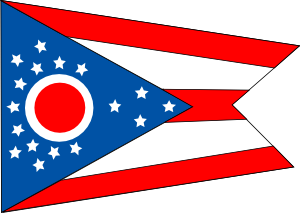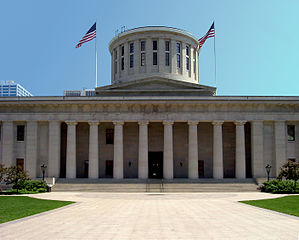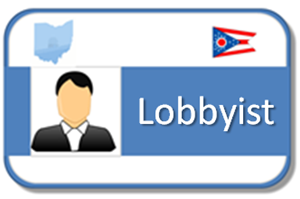June 16, 2014 •
Ohio Lawmakers to Introduce Campaign Finance Legislation
Ohio Reps. Nick Celebrezze and Ronald Gerberry announced plans last week to introduce legislation creating a campaign contribution blackout for the attorney general’s office. New legislation would prohibit contributions to the attorney general and to any party-endorsed candidates for the […]
 Ohio Reps. Nick Celebrezze and Ronald Gerberry announced plans last week to introduce legislation creating a campaign contribution blackout for the attorney general’s office. New legislation would prohibit contributions to the attorney general and to any party-endorsed candidates for the office while the office is reviewing bids on contract work.
Ohio Reps. Nick Celebrezze and Ronald Gerberry announced plans last week to introduce legislation creating a campaign contribution blackout for the attorney general’s office. New legislation would prohibit contributions to the attorney general and to any party-endorsed candidates for the office while the office is reviewing bids on contract work.
Celebrezze believes a blackout period will help eliminate the appearance of impropriety. Attorney General Mike DeWine, however, claims enforcement of the blackout periods makes the process inherently more political. Moreover, he said contributions have not influenced his decision to award contract work.
April 23, 2014 •
Ohio Lawmakers to Introduce Ethics Reform Legislation
Ohio lawmakers plan to introduce legislation next month making significant changes to state ethics rules for the first time in decades. The bill would double the amount lobbyists can spend on gifts to lawmakers but require lobbyists and public officials […]

Ohio lawmakers plan to introduce legislation next month making significant changes to state ethics rules for the first time in decades. The bill would double the amount lobbyists can spend on gifts to lawmakers but require lobbyists and public officials to report when a lobbyist spends more than $100 per year on an official for meals, entertainment, transportation, or other gifts.
State Sen. Larry Obhof, a Republican co-sponsor of the bill, maintains a higher reporting threshold is necessary to keep lobbyists honest, as many lobbyists seek to find ways to avoid the lower threshold.
Other notable legislative provisions raise the lobbyist registration fee from $25 to $35, strengthen whistle-blower protection guidelines, allow lawmakers to remedy reporting errors, require random audits of financial disclosure statements, and make changes to procedures for ethics investigations. Bill sponsors argue the bill is intended to increase transparency and accountability.
Photo of the Ohio State Capitol courtesy of Alexander Smith on Wikimedia Commons.
April 10, 2014 •
House Bill 483 to Alter Ohio Campaign Finance Law
On Wednesday, April 9, the Ohio House of Representatives passed a large piece of Gov. Kasich’s mid-biennium budget proposal. Prior to passage, House Republicans added numerous amendments to House Bill 483; it is now more than 800 pages long. One […]

On Wednesday, April 9, the Ohio House of Representatives passed a large piece of Gov. Kasich’s mid-biennium budget proposal. Prior to passage, House Republicans added numerous amendments to House Bill 483; it is now more than 800 pages long.
One amendment voids administrative rule 111-3-05 and changes state campaign finance law by lifting the disclosure requirement for corporations and labor organizations making independent expenditures. It also allows foreign-owned corporations and corporations with state contracts to spend money promoting or opposing state candidates.
Former Secretary of State Jennifer Brunner issued the rule in 2011 and fears its repeal will make it easier for national political interests to operate state-based Super PACs.
The bill passed the House by a primarily partisan vote of 57-33 and will now be sent to the Senate for consideration.
Photo of the Ohio State Capitol by Alexander Smith on Wikimedia Commons.
November 28, 2013 •
Ohio Ethics Commission Issues Rule Regarding Payment and Reimbursement of Travel Expenses
The Ohio Ethics Commission issued a new rule clarifying when another party may pay or reimburse a public official or employee for travel expenses. A public official or employee may accept a thing of value if it “is not of […]
 The Ohio Ethics Commission issued a new rule clarifying when another party may pay or reimburse a public official or employee for travel expenses. A public official or employee may accept a thing of value if it “is not of such a character as to manifest a substantial and improper influence on the traveler with respect to that person’s duties.”
The Ohio Ethics Commission issued a new rule clarifying when another party may pay or reimburse a public official or employee for travel expenses. A public official or employee may accept a thing of value if it “is not of such a character as to manifest a substantial and improper influence on the traveler with respect to that person’s duties.”
A two-prong test has been put in place for determining whether travel expenses or reimbursements are of such character.
The rule overturns portions of two previously issued Ohio Ethics Commission Advisory Opinions. It also requires public officials or employees to disclose the source and amount of all travel expenses and reimbursements.
November 13, 2013 •
Ohio Bill to Require Identification Badges for Lobbyists
Rep. Hagan introduced HB 339 last week. HB 339 would enact section 105.43 of the Revised Code and require the capitol square review and advisory board to issue identification badges to all lobbyists seeking entrance to capitol square. Each badge […]
 Rep. Hagan introduced HB 339 last week. HB 339 would enact section 105.43 of the Revised Code and require the capitol square review and advisory board to issue identification badges to all lobbyists seeking entrance to capitol square. Each badge would show a lobbyist’s name, a photograph of the lobbyist, clearly state the term “lobbyist” on the face of the badge, and list the lobbyist’s employer or employers.
Rep. Hagan introduced HB 339 last week. HB 339 would enact section 105.43 of the Revised Code and require the capitol square review and advisory board to issue identification badges to all lobbyists seeking entrance to capitol square. Each badge would show a lobbyist’s name, a photograph of the lobbyist, clearly state the term “lobbyist” on the face of the badge, and list the lobbyist’s employer or employers.
The bill also requires each lobbyist to carry a card stating the name of the person or persons whose interest the lobbyist actually represents; said card must be shown to any member of the general assembly requesting to see it.
October 14, 2013 •
Ohio Lobbyist IDs Not Yet Ready for Pickup
Notice to Disregard Erroneous Email
 Steve Friday of the Capitol Square Review and Advisory Board announced Lobbyist IDs are not yet ready for pickup. Those who received an erroneous email indicating anything to the contrary should disregard it.
Steve Friday of the Capitol Square Review and Advisory Board announced Lobbyist IDs are not yet ready for pickup. Those who received an erroneous email indicating anything to the contrary should disregard it.
The board is waiting on supplies before the remainder of the ID cards can be processed. An email notification will be sent out when the IDs are ready.
Substitute bill includes only services currently taxed
 House Speaker William G. Batchelder and Representative Ron Amstutz introduced a substitute for House Bill 59, Governor Kasich’s budget bill.
House Speaker William G. Batchelder and Representative Ron Amstutz introduced a substitute for House Bill 59, Governor Kasich’s budget bill.
Governor Kasich’s version of the bill would have overhauled the state sales tax by subjecting most services, including lobbying and consulting services, to the tax.
The substitute version of the bill eliminates those changes, leaving the current sales tax on services unchanged. If the substitute bill passes, lobbying and consulting services will remain untaxed in Ohio.
February 25, 2013 •
Ohio Issues Increased Campaign Contribution Limits
New limits effective for two years
 Ohio has increased its campaign contribution limits. Individuals, political action committees (PACs), and political contributing entities (PCEs) may now contribute up to $12,155.52 to any one statewide, senate, or house campaign committee during a primary or general election period, or to a PAC or PCE during a calendar year. An individual may contribute this same amount to the state candidate fund of a county political party in the individual’s county of residence. The previous limit was $11,543.70.
Ohio has increased its campaign contribution limits. Individuals, political action committees (PACs), and political contributing entities (PCEs) may now contribute up to $12,155.52 to any one statewide, senate, or house campaign committee during a primary or general election period, or to a PAC or PCE during a calendar year. An individual may contribute this same amount to the state candidate fund of a county political party in the individual’s county of residence. The previous limit was $11,543.70.
Additionally, the limit individuals, PACs, and PCEs may contribute per calendar year to any one state candidate fund of a state political party increased to $36,466.56 from $34,631.11, and to any one legislative campaign fund, $18,233.28, up from $17,315.55.
These limits are effective beginning February 25, 2013 until February 24, 2015.
February 15, 2013 •
Lobbying Services Could Be Taxed Under Governor Kasich’s Budget Plan
Ohio sales tax extended to many services currently exempt
 Lobbying and consulting services could soon be subject to sales tax under Governor John Kasich’s budget proposal. House Bill 59, the governor’s expansive budget bill, proposes to decrease the state sales tax rate, but makes up for lost revenue by increasing the services subject to sales tax. All service transactions would be subject to the tax unless specifically exempted in the bill, including legal and accounting services.
Lobbying and consulting services could soon be subject to sales tax under Governor John Kasich’s budget proposal. House Bill 59, the governor’s expansive budget bill, proposes to decrease the state sales tax rate, but makes up for lost revenue by increasing the services subject to sales tax. All service transactions would be subject to the tax unless specifically exempted in the bill, including legal and accounting services.
You can view a list of the services that will be covered by the sales tax here.
While Governor Kasich predicts lobbyists will attempt to remove the tax on their industry from the budget bill, a Florida Institute of CPAs lobbyist claims it’s not just self-interest–determining who is taxed and who pays can be tricky when lobbying firms hire both accountants and lawyers to assist with projects.
If passed, the sales tax will apply to all non-exempt services rendered on or after September 1, 2013.
December 19, 2012 •
Thank You, COGEL!
See you next year in Quebec City!
We would like to take this opportunity to thank the Council on Government Ethics Laws (COGEL) for a great conference in Columbus. Eleven of our staff from State and Federal Communications attended, and we had a terrific experience. There were so many information-packed sessions and it was nice to see old friends and make some new ones.
Here is a little video montage we made about our COGEL 2012 experience. Enjoy!
November 30, 2012 •
We’re Going to COGEL!
December 2-5, 2012
 State and Federal Communications is excited to be sending 11 people to the Council on Government Ethics Laws (COGEL) 34th Annual Conference in Columbus, Ohio. We are excited to have the conference in our home state capitol and we are helping every way we can – setting up, breakfast table topic leaders, a panelist for a breakout session, helping with social media, and more! It should be an exciting conference.
State and Federal Communications is excited to be sending 11 people to the Council on Government Ethics Laws (COGEL) 34th Annual Conference in Columbus, Ohio. We are excited to have the conference in our home state capitol and we are helping every way we can – setting up, breakfast table topic leaders, a panelist for a breakout session, helping with social media, and more! It should be an exciting conference.
Maybe we’ll see you there?
Here is COGEL’s description of the conference:
JOIN US
COGEL and its Ohio Partners invite you to the 34th Annual Conference in COLUMBUS, Ohio! This thought provoking and educational conference is an opportunity to celebrate US — professionals in the fields of ethics, campaign finance, lobbying, elections and freedom of information.
FOCUS
With dynamic sessions, stimulating guest speakers, challenging discussions and endless opportunities for networking, this year’s COGEL Conference is not to be missed! The program includes elements of communicating your mission, understanding new technology, and catching up on legislation and litigation.
BONUS
There’s always something fun happening in Ohio’s capital city. With a lively arts scene, plenty of restaurants, shops, sports and entertainment venues, you don’t have to venture far to have a good time. This year’s Sunday evening reception will take place in the beautiful and historic Ohio Statehouse, directly across the street from the Sheraton Hotel at Capitol Square.
November 26, 2012 •
Ohio Senate Bill 391 Will Overhaul State Ethics Law
Includes numerous changes to lobbying law
 Outgoing senate president Tom Niehaus has introduced a bill to overhaul the state’s ethics law. Senate Bill 391, if passed, will:
Outgoing senate president Tom Niehaus has introduced a bill to overhaul the state’s ethics law. Senate Bill 391, if passed, will:
- Increase the lobbyist registration fee to $35 (will take effect 12/1/14 if passed);
- Change the registration period for executive and retirement system lobbyists to two years, expiring on December 31 of even-numbered years (will take effect 12/1/14 if passed);
- Codify the percentage of time a lobbyist must spend on lobbying before being required to register;
- Increase the itemizing threshold for lobbyist expenditure reporting to $100;
- Exclude maintenance of office facilities and compensation paid to legislative agents from the definition of expenditure; and
- Increase the limit on gifts to public officials to $250, aggregated per calendar year.
The bill also provides additional requirements for financial disclosures from public officials.
March 27, 2012 •
Cuyahoga County Advisory Opinion Clarifies Ethics Ordinance
Charitable event tickets subject to the gift law limits.
 The Cuyahoga County Inspector General, Nailah Byrd, has issued an advisory opinion (IGADV-0005) regarding whether a public official or employee’s acceptance of a ticket to a charitable fundraising event violates any provision of the ethics ordinance.
The Cuyahoga County Inspector General, Nailah Byrd, has issued an advisory opinion (IGADV-0005) regarding whether a public official or employee’s acceptance of a ticket to a charitable fundraising event violates any provision of the ethics ordinance.
The opinion states that while the ethics ordinance does not explicitly prohibit the acceptance of a ticket, it does require certain conditions to be met.
A charitable event ticket given by a lobbyist or contractor must not include an extravagant or lavish meal, entertainment of significant value, or a fair market value price exceeding $75.
January 24, 2012 •
Bruce E. Bailey Named to Ohio Ethics Commission
Appointed to Replace Ben Rose
 Bruce E. Bailey, an attorney from Westerville, Ohio, has been appointed to the Ohio Ethics Commission. Bailey will be taking the seat held previously by former commission chairman Ben Rose.
Bruce E. Bailey, an attorney from Westerville, Ohio, has been appointed to the Ohio Ethics Commission. Bailey will be taking the seat held previously by former commission chairman Ben Rose.
Rose had requested Governor John Kasich not reappoint him for another term.Bailey’s term will run through January 1, 2018.
State and Federal Communications, Inc. provides research and consulting services for government relations professionals on lobbying laws, procurement lobbying laws, political contribution laws in the United States and Canada. Learn more by visiting stateandfed.com.


